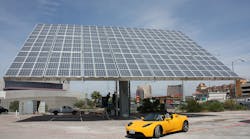Consistent improvements in technology and gradually lower costs will drive high-concentration photovoltaic (HCPV) systems to superior efficiencies, making HCPV an increasingly viable rival to conventional solar-generating solutions, according to the latest analysis from IHS Technology.
The cell efficiency of HCPV systems, currently at 40% to 42%, will exceed 45% by 2017. Such cells, used with concentrating optics, will then lead to commercial-system efficiencies approaching 40%, compared to the less than 35% conversion rates typical at present, as shown in the attached figure.
“Efficiency is the most important requirement in CPV technology in order to generate competitive energy costs,” said Karl Melkonyan, photovoltaic analyst at IHS. “And with the solar industry continuing to be firmly engaged in a quest for ongoing improvements through the development of new technologies, the efficiency of HCPV cells will advance over the years.”
The anticipated improvements in HCPV systems are based on cell efficiencies having reached 44.7% in laboratory conditions, indicating that further advances are possible.
Even so, the gains in efficiency will have to be balanced against the additional manufacturing costs expected to be incurred when implementing the improvements, Melkonyan noted.
These findings can be found in the report, “CPV on the Edge of Breakthrough,” from the solar research service at IHS.



